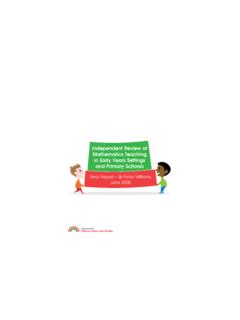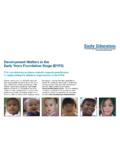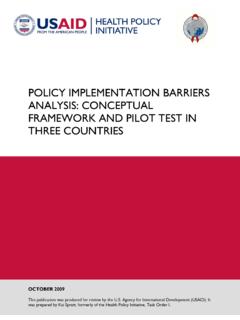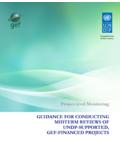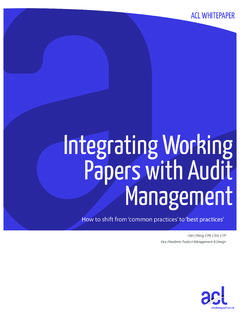Transcription of Garma Institute for Foundational Learning
1 2013 Jawun secondment final report Amy Zheng & Whitney Skinner The Boston Consulting Group 4/5/2013 Garma Institute for Foundational Learning Project Summary - External 4 April 2013 2 Project Background Since the inception of the Yothu Yindi Foundation (YYF) in the 1990s, the vision was there to create a special centre for education and culture in North East Arnhem Land (NEAL). This vision is frequently referred to as the Garma As YYF continues to grow and develop, there is an increased emphasis on addressing the needs of the Yolngu people adult education, job readiness training and pathways from welfare to work. Exhibit A: High level vision for Garma Institute Project Summary Exhibits for discussion onlyPoor foundation skillsLack of motivationTeachingbarriersSchool support and coordinationVET and adult pathwaysGarma unique barriers in North-East Arnhem specific support activities that build that Yolngucan steer the futurePrimary schoolEarly could be overcome through aligning community and high expectationsCulturally responsive, supportive environmentPractical Yolngu Learning Not in focus for Yo t huYindiEducation HubDhupumaCollegeSecondary schoolThe traditional education Recently, two sets of Jawun secondees have conducted over 100 conversations within the local community in Gove and other stakeholders to define the long term vision for the Garma Institute .
2 And conduct a feasibility study and preliminary development phase for the adult pathways component. This Project Summary document is the result of Phase 2, and includes detailed recommendations on the type of training that should be offered for "VET and adult pathways" 1 There have been several names used for this vision/concept, including Yothu Yindi Education Hub, Garma Hub etc. However, as of April 2013, the decision is to use " Garma Institute " by YYF management. Project Summary - External 4 April 2013 3 Community Needs & Demand Assessment To date, over 100 consultations have been held with stakeholders from government, the education sector, community leaders, private industries, Indigenous corporations, employers, education experts and Indigenous youth.
3 Exhibit B: Stakeholder consultation summary for Phase 1 and 2 of Project Through these community consultations, the team identified that there are a number of existing VET and adult pathway programs in the community today. The problem is not a lack of vocational and adult pathway programs. Rather, the underlying problem is that these existing programs are not able to prepare participants for employment, because students lack the basic reading, writing and comprehension skills (LLN language, literacy and numeracy), and other essential competencies such as time management, personal hygiene & wellbeing. In the absence of strong Foundational skills, existing VET programs cannot succeed in reaching their full potential and create a link to real employment. Trainings that can deliver Foundational skills can therefore address some of these challenges faced by VET programs in the region by delivering these fundamental skills.
4 Summary: the immediate gap on the education and employment pathway is Foundational Learning , and the proposed solution is the Garma Institute for Foundational Learning Project Summary - External 4 April 2013 4 Proposed Foundational Learning Project Framework The overall objectives of Garma Institute for Foundational Learning are: To deliver Foundational training and support greater success across current adult education and training programs in NEAL, while maximising usage of current infrastructure on the Gulkula site; To develop closer linkages between community organisations and employers to improve pathway from education & training to employment Foundational skills are defined here as critical life skills that enables the learner to achieve successful outcomes in vocational training and sustainable employment.
5 The three core areas of Foundational skills are outlined below, and in Exhibit C: Basic literacy and numeracy skills seeks to equip the learner with sufficient skills to understand vocational training materials, perform technical tasks (incl. measurement and calculation) and fully grasp occupational health and safety (OH&S) procedures Life skills include physical and mental wellbeing such as freedom from drugs and alcohol, personal hygiene and upkeep Basic job-readiness skills includes workplace communication, time management, money management, and team work Exhibit C: Definition of Foundational Learning 2013-04-01 -Project Summary for discussion onlyWellbeing:Drug & AlcoholWellbeing:Personal / CulturalBasic Literacy & NumeracyMotivation /ConfidencePersonal hygieneTime mgmtWorkplace comms& strategiesDriver's licenceAdditional Literacy & NumeracyTeamwork / LeadershipMoney mgmtThese are Foundational skills.
6 Literacy & NumeracyLife SkillsBasic job-readinessThey are a required stepping stoneto be successful in further training, and in jobsDesire from community to teach these skills in a practical way that incorporatesYolnguculture and family Note: Precise building blocks and curriculum will be developed by educationspecialists after initial project conceptualization has been finalized Foundational skills stepping stones Ultimately, Foundational Learning is not the ideal end-goal for the learner. Foundational Learning should rather enable the learner to pursue more advanced, job-specific training and vocational programs; it is the latter that will ultimately lead the learner to truly sustainable employment. Project Summary - External 4 April 2013 5 Foundational Learning pathway Exhibit D: Garma Institute proposed pathway for participants 2013-04-01 -Project Summary for discussion onlyPoor foundation skillsLack of motivationTeachingbarriersFoundational LearningALERT programOther vocational training Back to secondary schoolEmployment EmploymentYoung Yolngu men & women Young Yolngu jobseekers between the ages of 15-24, who may or may not have finished secondary school, are eligible for this proposed Foundational Learning program.
7 Their obstacles for gaining sustainable employment may include poor Foundational skills, lack of motivation and teaching barriers driven primarily by cultural gaps such as language and style of Learning . By participating in Foundational Learning , these young people are given the opportunity to undertake intensive training in a safe and culturally sensitive environment that delivers programs designed to overcome teaching barriers. The Garma Institute is designed to not replicate or replace school, but rather to enable those who have 'missed out' on the basics in their education to-date to gain Foundational skills through structured Learning as well as practical activities such as camping, cooking, ground facility management, work experience, sports and art. At the end of the course (estimated to be ~8 weeks), the program will work with the learner to choose the next step in the path entry-level employment, ALERT training from Pacific Aluminium, other VET education, or back to secondary school where appropriate.
8 Project Summary - External 4 April 2013 6 Proposed Operational Model Exhibit E: Foundational Learning operating model is culturally rich, geared to jobs Project Summary Exhibits for discussion onlyTwo-way Learning Yolnguand non-Yo l n g uinstructors using both English and YolnguMathaCultural and recreational activities Activities to engage youth and promote personal development , story telling, sports & rec, spear making, healing, Linkage to real jobs Employers engaged at start Foundational skills support further VET training Applied skills incl. cooking, camping, building blocks Applied literacy and numeracy Life skills Work readiness Teamwork57 Pilot: ~100km radius from Gulkula(land travel at first) However, not limited to participants from further awayGeography1 Focus: 15-24 year olds Other age groups not precluded Pilot: 20-30 participants Young Yolngu men & women2 Camp-style training Participants accommodated through camping facilities Exercise responsibility and self-management4 Customized Learning 6 Customisedlearning based on in-coming skills & capabilities 38 Based on consultations, there is general community consensus that the Garma Institute for Foundational Learning should.
9 Look and feel different than a school or classroom environment Deliver Learning programs that addresses the Learning needs of Yolngu youth, including the need to incorporate practical, applied hands-on Learning opportunities relevant to employment, and have instruction be in both English and Yolngu Matha Include an element of assessment upfront that is linked cohesively with any other assessments ( , with RJCP) Create personalised development plans and pathways based on individual skill levels, Learning needs, and employment ambitions Provide on-going, personalised mentorship and support through the process, including post-program completion support, in order to work with the individual on pathway to employment Project Summary - External 4 April 2013 7 Partnerships are critical to making the Garma Institute a reality The Garma Institute for Foundational Learning seeks to benefit multiple clans and families in NEAL, and provide one component within the broader regional education and employment strategy.
10 Therefore, identifying and establishing effective partnerships with key stakeholders is critical for success of the project. These stakeholders are shown in Exhibit F below: Exhibit F: Partnership landscaping 2013-03-21 -Stakeholder Engagement for discussion onlyKey partners required to move project forwardClan groups & Aboriginal CorporationsEmployersGovernment and Agencies Educators, incl. RTOsRalpa/ ALERTRJCPS econdary schoolsOther RTOsThese partners can form the steering group for Foundational training Note: partners list not exhaustive The Garma Institute for Foundational Learning will be governed by a Steering Group that reports to the Yothu Yindi Foundation Board. This Steering Group should be composed of representatives from the four core groups of stakeholders. Link to Jobs One of the most important success factors in this pathway is the link to employment.





